Sunday, June 25, 2006
Tokyo reflections
Tokyo, by reputation, delivers the greatest possible culture shock. Visiting this vast, incredible megacity last week, it was less shock, more awesome sensory overload. It’s clean, safe, high tech, bright, new, busy and quite unlike anywhere I’ve seen in Europe, North America or Africa.
The longer I live in London, the more cities enthral me. How do they function? Do they function? Are they healthy, happy places? Are they places that produce unique cultures and people that can only exist in cities? Or are they places that produce unique problems? Discovering Tokyo with a mangled body clock, these questions remain – except with a whole new set of possible answers.
A few days after landing, some people who knew far more about these issues met in Vancouver to discuss them. (Check the BBC’s awesome interactive guide to the global megacity growth here for a wider view).
On scale alone, Tokyo is breathtaking. London has around 8 million people, Greater London 12 million – from a vantage point like the London Eye it sprawls as far as the eye can see. Tokyo has 12 million people but Greater Tokyo a staggering 35 million. From a vantage point – the Park Hyatt, Dentsu or Ebisu towers for example – you can’t even see out as far as where the sprawl of endless dormitory towns begins.
In the way that London feels like it has a centre in the West End, there is no one focus to Tokyo. Instead there are perhaps several delocalised major hubs like Shibuya, Shinjuku, bayside area and Ueno. Each of these areas lays claim to being some kind of centre of gravity in part because of some serious skyscraper action.
So much of Tokyo is just up. How do you fit 35 million Greater Tokyo workers into a 12 million Tokyo space? You stack them. From the aforementioned vantage points the skyline is one jagged cluster of clean, 50 story skyscraper after another. One effect is to create a visually incredible landscape, especially by night. This is the city that inspired Ridley Scott to make Bladerunner and its clear why, although personally I couldn’t stop muttering the tanoy announcements saying “Welcome to the Offworld...” from, ahem, Total Recall.
Another tangential effect is that with all the tall buildings Tokyo’s airspace is closed, removing the constant drone of flight path noise pollution you experience in London and any additional Al-Qaeda plane crash paranoia (Japan just pulled its troops out of Iraq which should help).
Talking of paranoia and malevolent urban undercurrents, on first impressions, Tokyo has none. Tokyo is safe. Now to be fair, London is safe. If you know what you’re doing (“yes bro, safe, safe...”) London is fine. Keep your wits about you, don’t act like a dick in the real danger areas (y’know: Ikea store opening nights, Hammersmith high street at Skool Disco chucking out time...) and you’re fine. But still it’s a serious place.
Tokyo is virtually crime free. Drugs are totally taboo. Not that it’s an empirical measurement of anything but the two clubs I went to (Unit and Bullet’s) I saw not the slightest hint of weed or any substance abuse. Talk is that there are fairly large organised crime syndicates in Tokyo, but in civilised fashion they all have respectable offices in the same district. I wandered around Kabukicho, near Shinjuku, which has some sex industry, and it was just as concealed as Soho’s, if not drowned out by a hundred thousand neon lights plus the ear piercing rattle of Pachinko pinball slot machines ( a massively popular game played with hundreds of falling ball bearings) and the shockingly bad Japanese-Euro-pop-trance that accompanies it.
The only slightly gully place I got into in an entire week of exploring was Shomben Yokocho (aka "Piss Alley") not far from Kabukicho. Ducking behind Shinjuku station tracks, I found myself in a tiny alley full of exposed, tangled dusty wiring. Sunlight dripped through the narrow passage to the sky. To either side were tens of tiny thin bars, each no more than three metres deep and one wide, stacked one after another in this twisty alley. Some were closed off by curtains, others had grills where bartenders cooked yakitori over tiny charcoal fires; all were full of locals. It was the only place as a 6’6” conspicuous gaijin (foreigner) I didn’t feel welcome in a whole week in Tokyo. So yes, 35 million people and pretty much no drugs, litter or crime? It’s nuts.
One anecdote relayed to me describes perfectly both the safety of the city and the cause of it – Japanese society. Travelling home on an otherwise rammed underground train, one seat was strangely left empty. On closer inspection someone had dropped their wallet. But not only did no one steal it, everyone was too polite to touch the wallet, for fear of being accused of stealing it.
Japanese society is a wonder. Ex-pat residents in Tokyo say even six months of contact with it reveals only the surface. It’s deeply, deeply reverent. “Face” is everything. Public humiliation the ultimate punishment. The Japanese bow, not shake hands, (though amusingly when I first met Masamitsu, the club promoter who booked me, it was the international garage ‘yesbruv’ handshake we used hehe). But you don’t just bow when you first meet people. Hotel staff will bow every time you enter the front door. Shop staff don’t bow, they sing ‘welcome’ to you! In busy department stores (the Japanese are obsessed with massive department stores like Tokyu and Seibu) where scores of people enter and leave a given area, the chorus of ultra high pitch ‘welcomes’ becomes overwhelming.
One massive difference between London and Tokyo, is the racial mix. Even when you head out to suburbia or provincial UK towns, you’re aware of London’s rich melting pot. Tokyo has none of this. 99.9% of the people you see on the street seem to be Japanese nationals. Watching tens of thousands of people, if not more, flood towards you on the subway or at Shibuya crossing, you see one or two black people a day. The only concentration of any note of black faces is in Roppongi, the expat nightclub district, where you can see them working for the clubs on the streets trying to entice punters (pretty much everywhere else, from the markets of Ameyoko-Cho to Asakusa, if anyone speaks to you on the streets its to be friendly, not to give you the hard sell Europeans are so used to at home or abroad in places like Africa).
In relation to the black guys who work Roppongi crossing, residents explain that parts of Japanese society can be fairly racist, and that this is some of the only work black people in Tokyo can get. Certainly the Japanese are very nationalistic, but it’s hard to work out if the suggestion of racism is true without spending extensive time in Tokyo. On the issue of nationalism it would be interesting to know more about the details of the Japanese-North Korean-Chinese relations, given the suggestions of pre-emptive strikes by the US on North Korean missile tests going on while I was there. (Remind me where a pre-emptive strike stops and an unprovoked attack on a nation’s sovereign soil starts again?)
Nationalism or not, it’s clear that both Tokyo isn’t the multicultural melting pot London is. It is also well accepted that in Japanese culture, no matter how long you stay there, you’ll always be a gaijin (foreigner). The latter must be pretty depressing for long term immigrants, and hardly what you call cultural integration.
People watching on the incredible tube system was a joy (check a pdf. of the tube map here - this doesn’t even include most of the train networks!). On some clumsy sexual scale, in Japan it’s like there’s been a mass shift to the feminine side. Women are most definitely women: high heels are the norm, as well as petite miniskirts, trainers rare. Men however, standardly don fashion they’d risk ridicule for back in the UK (however much that matters…), the pinnacle of which is the handbag – not man-bag – yes handbag. The buffont 80s rock mullets are worth a mention too, ubiquitous amongst the Japanese men who try and entice girls into the ‘host bars’ of Kabukicho where, in a nice sexual roll reversal from much of Western culture, the men are paid to entertain and serve the women.
How Westerners interact with Japanese sexual politics is interesting. Japanese women, when they get married, largely give up their jobs to serve their husbands. So when they encounter Western men with more egalitarian views on relationships, some jump at the chance. The dynamic produces the phenomenon of the Western male “LBH” (loser back home) who suddenly becomes a sexual magnet abroad. By complete contrast, Western women experience near indifference from Japanese men, given their likely unwillingness to conform to traditional Japanese relationship dynamics.
But to describe Tokyo as all skyscrapers and neon lights, high technology and future culture is to miss half of the city. With its rich heritage and unbroken historical legacy that stretches back on the same location to before 1457, Tokyo – originally known as Edo – is a city of contrasts, both of which are worth absorbing. At the geographic centre is the Imperial Palace, still the residence of the Emperor the longest reigning dynasty in the world and someone who the Japanese, until the end of the Second World War, considered a living deity who could not be seen nor heard.
Nowadays the Emperor has no political powers. Two religions remain: Shinto and Buddhism. In modern Japan religion seems to play more of a social role than one of faith, as people often happily engage with both religion’s key ceremonies throughout their lives. Between the Emperor and the two religions, they provide the city with much of its precious green spaces. New York and Paris have 29 and 26 square metres per resident respectively; Tokyo has just 5.3 – and much of the Emperor’s gardens remain off limits. But the Shinjuku Gyoen garden, the Senso-ji temple and the Meiji-jingu shrine (nr Yoyogi-koen park) all respectively provide peaceful escapes from the sensory overload of modern Japan. They also seemingly provide somewhere for the homeless to rest.
Amid this clean, functioning, safe, drug-free, polite and ever so slightly effeminate but very unique city, I couldn’t help but wonder how my brand of ruffneck dark garage was going to go down. It seemed a very long way from the dark suburban decay of south London dubstep, or the innercity urban rage of east London grime. Will it get lost in translation?
Finding Bullet’s was amusing enough itself. Beginning by walking away from Roppongi, a fairly key club hub, I followed a massive raised freeway (Tokyo is full of these: local traffic at street level, national traffic cruises through 10m above uninterrupted. What traffic jams?) until the din of Roppongi faded. Suddenly it was right down a non-descript residential side-street, left down another until you came to, um, a massive English mock-Georgian terrace house. Yes it was like Regents Park’s Park Crescent, except in Tokyo. Anyway, opposite this was a posh yet slightly sterile bar. Round the back of it, down some concrete steps, was Bullet’s, less a club, more an underground community art space. There were paintings on the loo walls, a budgie in a cage at the bar and there were two beds, one of which had its headboard bolted to the wall. The speakers were in the dark, unlit half: basically it was Plastic People if the art school crowd got to do the decor. If dubstep is to take a hold in Tokyo, it’s in early adopter places like these, so shouts to promoter and DJ Masamitsu and my interpreter for the night, Eric.
Reviewing your own sets is bait, but lets just say playing the new bits I’d cut at Transition (Horsepower’s “Traitor remix”, Mala’s “Learn”, Kode 9’s “Fat Larry remix” and Zombie’s “Memories”) alongside some of my own productions like “Lata” and all parts of the “Mantis” trilogy was, like Tokyo itself, a fucking lot of fun.
Subscribe to:
Post Comments (Atom)
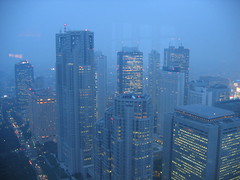
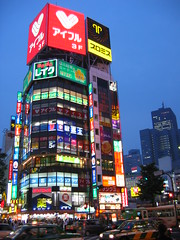
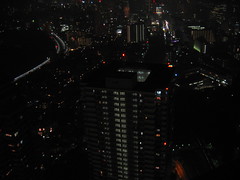
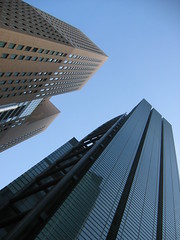
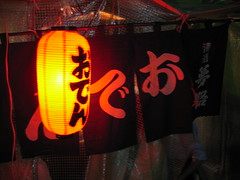
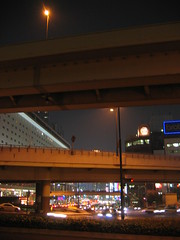
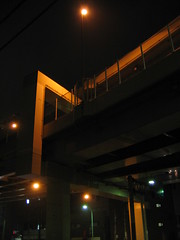
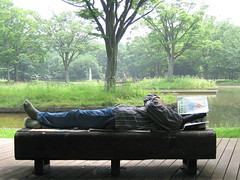
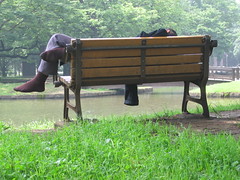
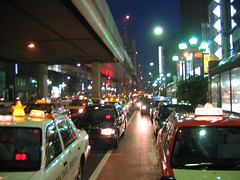
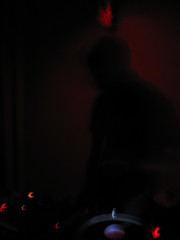
10 comments:
drug free japan? you weren't looking hard enough... there are lots of designer psychedelics available over the counter in head shops in the big cities... all kinds of crazy stuff.
hey joe - you know what, that club made you take off your shoes. so i was djing barefoot: the spirit of joe nice was in the house.
lethal - nah cuz, no freeness.
tryptych - you're right, i wasnt looking at all. what do people take?
A hell of a write up and one that nails the magical contradictions of the country perfectly. Makes me homesick for Sapporo and even more stoked to heading back there next year.
As for drugs, well, there's more than a few legal loopholes that allow people to capitaise on herbal substitutes. shrooms, dmt, amt, anything that claims to not be the real thing but still can fuck you up.
Cool now i really really really REALLY want to go! Wicked article, nice one.
nice article, good photos too. how did you get passed the language barrier?makes me really want to go aswell
A mate knew the basics. But really and truly most of the Tokyo residents knew enough English for us to blunder through. When they didn't we used pointing or gestures!
Wow. Great piece, Martin....
Thanks for this article. Should be in Tokyo on a biz trip in a week and was googling the Black experience there to know what to expect. This helps alot, plus I learnt the meaning of "egalitarian". Haha.
Thanks man.
i rarely read entire blogs on the internet (am usually too rushed or too preoccupied or too lazy!) but i read yours completely. it's wonderfully written, very informative as well as both useful and relevant to me:
i'm currently in tokyo right now with my boyfriend, we've been here since october 2, we're here to celebrate my birthdays (october 8, 12) and we leave october 17... i'm finding tokyo to be much as you described it, it's our first time here and it's a wonderful, wonderful city. clean, enormous, amazing, crazy...
would love to find the "things" we usually like but it's hard and we've not really looked as far as candy is concerned (the opposite of pepsi and the missing vowel in the word "the.") anyway. we've not nightlifed it at all yet, our body clocks are still quite fucked (we're from toronto canada). plus we've no idea where we can go to hear good music here (dubstep, experimental electronics).
would love to catch some dubstep or some shows with artists/music like venetian snares, flashbulb, terminal 11, vorpal, skream, vex'd, et al... any recommdations? thanks whichever way things might or do go and thanks again too just for this article. nice to read and worth the while! have you been back again to tokyo?
cheers,
take care.
nunich
Amazing article... im pretty late reading this since it was written four years ago...! but i'm going to tokyo later this year and was planning on trying to find some dubstep out there. brilliantly informative.
thanks,
Oli
Post a Comment